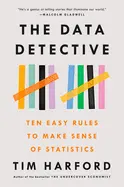
The Data Detective - by Tim Harford
ISBN: 0593084594Date read: 2021-06-27
How strongly I recommend it: 4/10
(See my list of 430+ books, for more.)
Go to the Amazon page for details and reviews.
If you haven’t read books about statistics, this is a good fun overview. Unfortunately I have, so it was too familiar. And it’s written from the very-current world of media defensiveness, preparing you to argue and challenge media headlines. Not for me.
my notes
The crooks already know these tricks; honest men must learn them in self-defense.
The motto of the Royal Society, is Nullius in verba - “Take nobody’s word for it.”
I worry about a world in which many people will believe anything, but I worry far more about one in which people believe nothing.
Populists and propagandists want us to shrug, give up on logic and evidence, and retreat into believing whatever makes us feel good.
When we encounter evidence that we dislike, we ask ourselves, “Must I believe this?”
More detail will often give us more opportunity to find holes in the argument.
When we encounter evidence that we approve of, we ask a different question: “Can I believe this?”
More detail means more toeholds on to which that belief can cling.
When a measure becomes a target, it ceases to be a good measure.
Once you start using a statistical metric as a target to be improved, or a metric to control others at a distance, it will be distorted, faked, or undermined.
A fifty-year newspaper:
Topics that seemed earth-shattering to the daily newspapers of the time might not be mentioned at all, while huge changes in the world would scream from the front pages.
Readers of the 1968 newspaper would have read anxiously about how, over the previous three decades, the atomic bomb had been invented, developed, used on Japan with catastrophic effect, then it would be big news that the Cold War had simply ended without a nuclear exchange of any kind.
How about a hundred-year newspaper?
The perspective changes again.
Thinking about readers who last consulted a newspaper in 1918, you might decide to offer a leading story about the miracle of safe childhood: “Child Mortality Falls by a Factor of Eight!”
For a two-hundred-year newspaper, the editorial board might take yet another angle: “Most People Aren’t Poor!”
A tenfold gap in sexual activity - with one person having sex once a month, and another having sex ten times a month - is far more common than a tenfold gap in income.
Good news tends to unfold slowly, while bad news is often more sudden.
It is, after all, quicker to knock something down than to build it.
So when media outlets want to grab our attention, they look for stories that are novel and unexpected over a short time horizon - and these stories are more likely to be bad than good.
Kickended.com, searched Kickstarter for all the projects that have received absolutely no funding.
It reminds us that what we see around us is not representative of the world.
I have never read a media report or blog post about the projects go nowhere at all.
On the other hand, I’ve heard quite a lot about the Pebble watch.
If I didn’t know better, I might form unrealistic expectations about what running a Kickstarter campaign might achieve.
Derren Brown once produced an undoctored film of him tossing a coin into a bowl and getting heads ten times in a row.
Brown later explained the trick: the stunning sequence came only at the end of nine excruciating hours of filming, when the string of ten heads finally materialized.
High-profile psychological studies were more likely not to replicate than to stand up.
The famous psychological results are famous not because they are the most rigorously demonstrated, but because they’re interesting.
There is nothing an audience won’t understand.
The only problem is to interest them.
Once they are interested they understand anything in the world.
Stop and notice your emotional reaction to a claim, rather than accepting or rejecting it because of how it makes you feel.
Combine the statistical perspective with the personal view.
Look at the labels on the data you’re being given, and ask if you understand what’s really being described.
Look for comparisons and context, putting any claim into perspective.
Look behind the statistics at where they came from - and what other data might have vanished into obscurity.
Ask who is missing from the data we’re being shown, and whether our conclusions might differ if they were included.
Curiosity is an antidote to tribalism.
One of our stubborn defenses against changing our minds is that we’re good at filtering out or dismissing unwelcome information.
Curious people enjoy being surprised and hunger for the unexpected.
They will not be filtering out surprising news, because it’s far too intriguing.
There’s a sweet spot for curiosity: if we know nothing, we ask no questions; if we know everything, we ask no questions either.
Curiosity is fueled once we know enough to know that we do not know.
Alas, all too often we don’t even think about what we don’t know.
Subjects had felt they understood zippers and lavatories, but when invited to elaborate, they realized they didn’t understand at all.
The illusion of explanatory depth is a curiosity killer and a trap.
If we think we already understand, why go deeper? Why ask questions?
Gaps in knowledge can fuel curiosity.
Please elaborate; tell us exactly what unilateral sanctions are and how a flat tax works. And the same thing happened.
People said, yes, they basically understood these policies fairly well. Then, when prompted to explain, the illusion was dispelled.
They realized that perhaps they didn’t really understand at all.
More striking was that when the illusion faded, political polarization also started to fade.